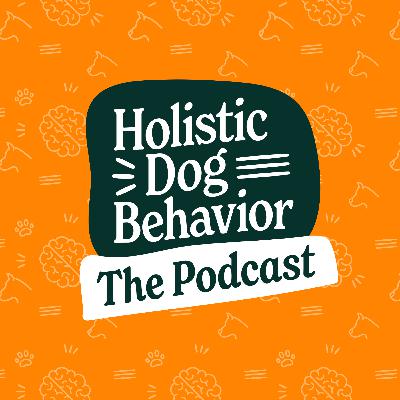Triggers, Stress, and How They Shape Your Dog's Behavior
Description
Welcome to Holistic Dog Behavior The Podcast!
In this episode, Megan (CDBC) and Bridget dive into the fascinating world of triggers and stress, exploring how they impact your dog’s behavior and overall well-being. Learn how to recognize triggers, manage stress levels, and use science-backed techniques to help your dog navigate a challenging world. If you’ve ever wondered why your dog acts out or seems overwhelmed, this is the episode for you!
Episode Highlights:
00:00 — Intro & Disclaimer (Feel free to skip if you’ve heard it before!)
12:39 — Topics Overview: Breaking down triggers, stress, and the importance of the environment.
14:03 — Understanding Triggers: What they are, how to identify them, and why they’re key to solving behavior issues.
28:09 — What is Stress? Recognizing signs of stress in your dog and why it matters.
32:00 — Social Learning in Dogs: How dogs observe and imitate others (including their friends) to earn rewards or change behaviors.
39:00 — Dysregulation: What happens when a dog’s emotional system is overwhelmed.
40:00 — Co-Regulation: The role of the human-dog relationship in helping dogs return to a calm state.
- 43:00 — The Effects of Cortisol on Learning: Why stress hormones can make it impossible for dogs to process information or learn new things.
Connect with Us:
Website: Holistic Dog Behavior
Instagram: @HolisticDogBehavior
Send us your questions for future episodes here!
Don’t forget to subscribe, rate, and review on your favorite podcast platform to support us and help more dog owners discover our show!
Research References
Research on Dogs Observing and Imitating Other Dogs:
Range, F., & Huber, L. (2008). Imitation and emulation by dogs using a bidirectional control procedure. *Behavioural Processes, 78*(3), 492-498. https://doi.org/10.1016/j.beproc.2008.03.002
Huber, L., Range, F., & Virányi, Z. (2018). Social learning from conspecifics and humans in dog puppies (Canis familiaris). *Scientific Reports, 8*(1), Article 10356. https://doi.org/10.1038/s41598-018-27654-0
Research on the HPA Axis in Dogs:
Beerda, B., Schilder, M. B., van Hooff, J. A., de Vries, H. W., & Mol, J. A. (1999). Chronic stress in dogs subjected to social and spatial restriction. *Physiology & Behavior, 66*(2), 233-242. https://doi.org/10.1016/S0031-9384(98)00289-3
Gácsi, M., Maros, K., Sernkvist, S., Faragó, T., & Miklósi, Á. (2013). Human-directed social behavior in dogs shows significant similarity to attachment behavior of infants. *Animal Cognition, 16*(2), 1-14. https://doi.org/10.1007/s10071-013-0649-5
Research on Stress and Prefrontal Cortex Function:
Arnsten, A. F. T. (2009). Stress signaling pathways that impair prefrontal cortex structure and function. *Nature Reviews Neuroscience, 10*(6), 410-422. https://doi.org/10.1038/nrn2648
Liston, C., McEwen, B. S., & Casey, B. J. (2009). Psychosocial stress reversibly disrupts prefrontal processing and attentional control. *Proceedings of the National Academy of Sciences, 106*(3), 912-917. https://doi.org/10.1073/pnas.0807041106
Research on Cortisol and Neural Pathways:
McEwen, B. S. (2007). Physiology and neurobiology of stress and adaptation: Central role of the brain. *Physiological Reviews, 87*(3), 873-904. https://doi.org/10.1152/physrev.00041.2006
Sapolsky, R. M. (2004). Why stress is bad for your brain. *Science, 273*(2), 749-750. https://doi.org/10.1126/science.273.5276.749





